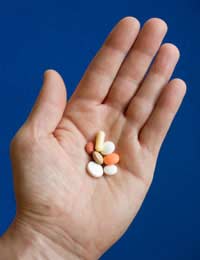How Ace-Inhibitors Help Heart Patients

The term ACE-Inhibitor stands for angiotensin-converting enzyme inhibitor and these are drugs most commonly prescribed to those with high blood pressure or congestive heart failure (CHD).
What are They Exactly and How do They Work?
Angiotensin I is a substance we all have naturally in our body. When this is released it is converted into angiotensin II by another substance called Angiotensin Converting Enzyme (ACE). Angiotensin II is necessary when we need our blood vessels to narrow (vasoconstrict) and raise our blood pressure. The substance called ACE is also important in the control of how much blood we have in our vessels.ACE-Inhibitors block the conversion of angiotensin I to angiotensin II. The effect of this is that the blood pressure is reduced meaning the force of the blood through the vessels is decreased. This helps cardiac function by lessening the amount of work the heart has to do as it doesn’t need to beat as strongly as it did when the blood vessels were narrower.
In addition, by reducing the amount of blood volume we have also means there is less blood for the heart to process, further decreasing its work.
These drugs are used in the treatment of almost all patients with congestive heart failure and frequently for those with high blood pressure that has not decreased by altering lifestyle or using other medications.
What Other Medications do I Need?
High blood pressure can be tackled in many ways and the type of treatment you are offered will depend on the cause of your high blood pressure so it is common for these patients to take different drugs to others with the same condition.In the treatment of congestive heart failure, it is almost certain that you will need a water tablet (diuretic) as well, in order to reduce the excess fluids that can build up in the tissues as a symptom of the illness.
Do They Have any Side-effects?
As ACE-Inhibitors work by reducing your blood pressure, extra care will have to be taken when moving suddenly, especially when assuming a standing position after sitting or lying down. These actions cause changes in the blood pressure of all of us, but for those on ACE-Inhibitors, the drop can be very sudden and quite severe causing dizziness or feeling faint.Suffering from a dry and annoying cough is a common side-effect of the taking these drugs so ease with lozenges and sipping lots of water throughout the day.
Always take your medication as prescribed and do not take more than the prescribed dose even if you have missed an earlier tablet.
If you are taking water tablets, try and take these in the morning so your bladder can be emptied during the day instead of during the night which can leave you feeling even more tired and lethargic the next day.
Keep a diary of weekly weight as this will indicate whether you water tablets are working correctly determining whether your prescribed dose is sufficient for your needs.
ACE-Inhibitors are very powerful drugs and alter the pressure at which your blood is being forced through your blood vessels. By lessening this pressure the workload on the heart is reduced as each beat can be performed with less force.


Re: Laser Surgery for Coronary Artery Disease
I was diagnosed with Idiopathic Pulmonary Fibrosis (IPF) four years ago. For over two years, I relied on…
Re: Coronary Angioplasty Surgery
My husband had a stent put in at the beginning of January. It was done at a government hospital and the doctors appointment is…
Re: Hole in the Heart: What Happens Next?
I was just in hospital with left side pain and numbness was diagnosed with hole in heart I’m home now and I’m having…
Re: Hole in the Heart: What Happens Next?
Ok I'm 61 yes old.ive been in 3 motorcycle wrecks,I have sticky platelets I've been hospitalized 3:times with blood…
Re: Why Does My Heart Beat Faster After Sweet Food?
The coffee doesn't make a heart beat faster. Caffeine makes the hart beat harder/stronger. The sugar…
Re: Hole in the Heart: What Happens Next?
Hi Doctor, My friend is having 35 years and he is having a hole in the heart, he consulted many doctors in USA and…
Re: What is Heart Block?
Hello. I have born first degree heart block. 10 years ago was temporarily changing to 2 degrees, but stay first degree. Am I at high risk…
Re: Hole in the Heart: What Happens Next?
In Sept '16 I was diagnosed with hypertension (high blood pressure) and in May '17 I had a stroke - the only symptoms…
Re: Hole in the Heart: What Happens Next?
Hi Iam 53 years old and living very healthy life. I have blood pressure but it is in normal condition with proper…
Re: What is Heart Block?
Hi there I had a pacemaker fitted last year for Mobitz II heart block. My pacemaker is set to fire if my rate drops below 60 b/pm. Am I…